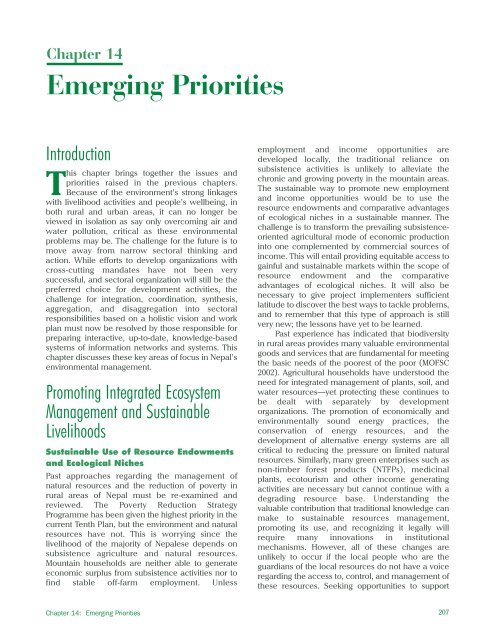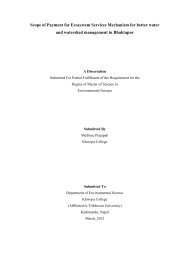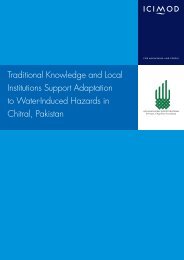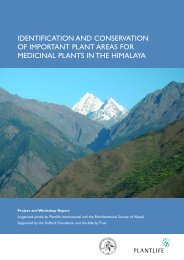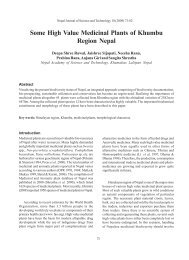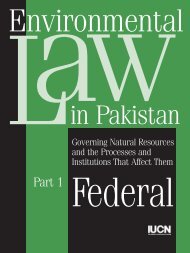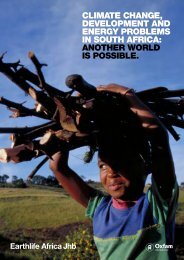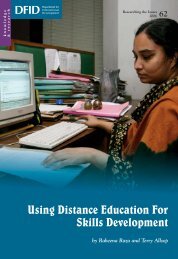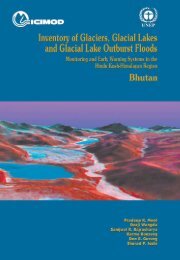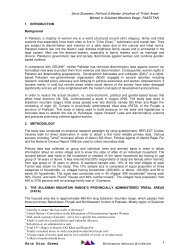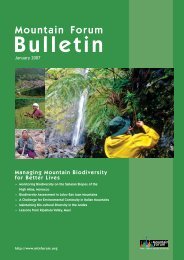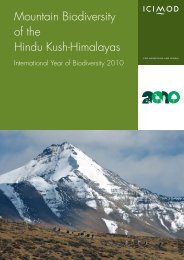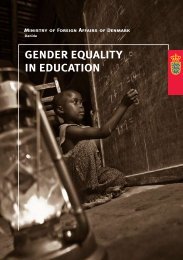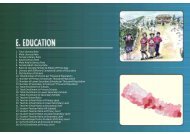ADB_book_18 April.qxp - Himalayan Document Centre - icimod
ADB_book_18 April.qxp - Himalayan Document Centre - icimod
ADB_book_18 April.qxp - Himalayan Document Centre - icimod
- No tags were found...
You also want an ePaper? Increase the reach of your titles
YUMPU automatically turns print PDFs into web optimized ePapers that Google loves.
Chapter 14Emerging PrioritiesIntroductionThis chapter brings together the issues andpriorities raised in the previous chapters.Because of the environment’s strong linkageswith livelihood activities and people’s wellbeing, inboth rural and urban areas, it can no longer beviewed in isolation as say only overcoming air andwater pollution, critical as these environmentalproblems may be. The challenge for the future is tomove away from narrow sectoral thinking andaction. While efforts to develop organizations withcross-cutting mandates have not been verysuccessful, and sectoral organization will still be thepreferred choice for development activities, thechallenge for integration, coordination, synthesis,aggregation, and disaggregation into sectoralresponsibilities based on a holistic vision and workplan must now be resolved by those responsible forpreparing interactive, up-to-date, knowledge-basedsystems of information networks and systems. Thischapter discusses these key areas of focus in Nepal’senvironmental management.Promoting Integrated EcosystemManagement and SustainableLivelihoodsSustainable Use of Resource Endowmentsand Ecological NichesPast approaches regarding the management ofnatural resources and the reduction of poverty inrural areas of Nepal must be re-examined andreviewed. The Poverty Reduction StrategyProgramme has been given the highest priority in thecurrent Tenth Plan, but the environment and naturalresources have not. This is worrying since thelivelihood of the majority of Nepalese depends onsubsistence agriculture and natural resources.Mountain households are neither able to generateeconomic surplus from subsistence activities nor tofind stable off-farm employment. Unlessemployment and income opportunities aredeveloped locally, the traditional reliance onsubsistence activities is unlikely to alleviate thechronic and growing poverty in the mountain areas.The sustainable way to promote new employmentand income opportunities would be to use theresource endowments and comparative advantagesof ecological niches in a sustainable manner. Thechallenge is to transform the prevailing subsistenceorientedagricultural mode of economic productioninto one complemented by commercial sources ofincome. This will entail providing equitable access togainful and sustainable markets within the scope ofresource endowment and the comparativeadvantages of ecological niches. It will also benecessary to give project implementers sufficientlatitude to discover the best ways to tackle problems,and to remember that this type of approach is stillvery new; the lessons have yet to be learned.Past experience has indicated that biodiversityin rural areas provides many valuable environmentalgoods and services that are fundamental for meetingthe basic needs of the poorest of the poor (MOFSC2002). Agricultural households have understood theneed for integrated management of plants, soil, andwater resources—yet protecting these continues tobe dealt with separately by developmentorganizations. The promotion of economically andenvironmentally sound energy practices, theconservation of energy resources, and thedevelopment of alternative energy systems are allcritical to reducing the pressure on limited naturalresources. Similarly, many green enterprises such asnon-timber forest products (NTFPs), medicinalplants, ecotourism and other income generatingactivities are necessary but cannot continue with adegrading resource base. Understanding thevaluable contribution that traditional knowledge canmake to sustainable resources management,promoting its use, and recognizing it legally willrequire many innovations in institutionalmechanisms. However, all of these changes areunlikely to occur if the local people who are theguardians of the local resources do not have a voiceregarding the access to, control, and management ofthese resources. Seeking opportunities to supportChapter 14: Emerging Priorities207


